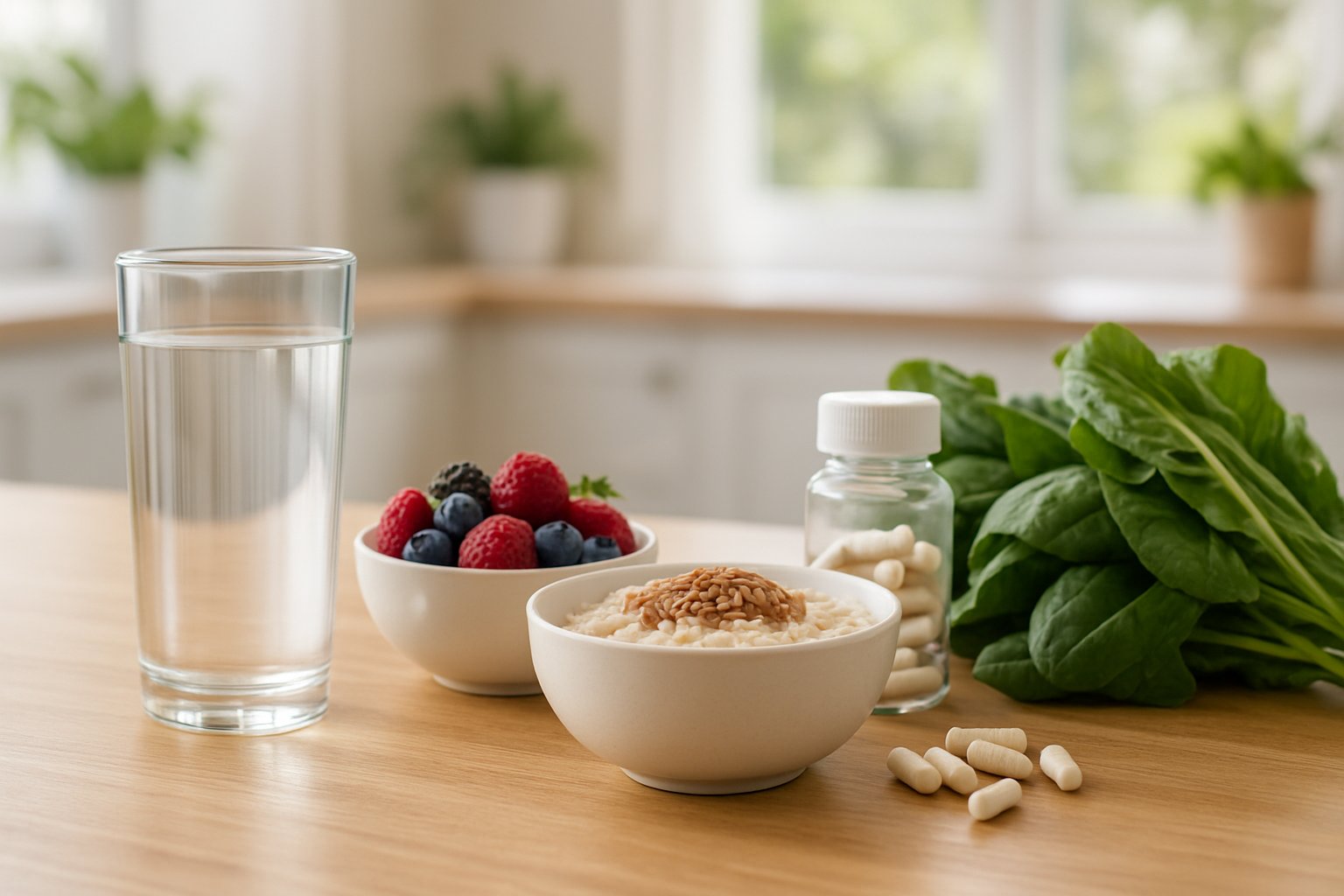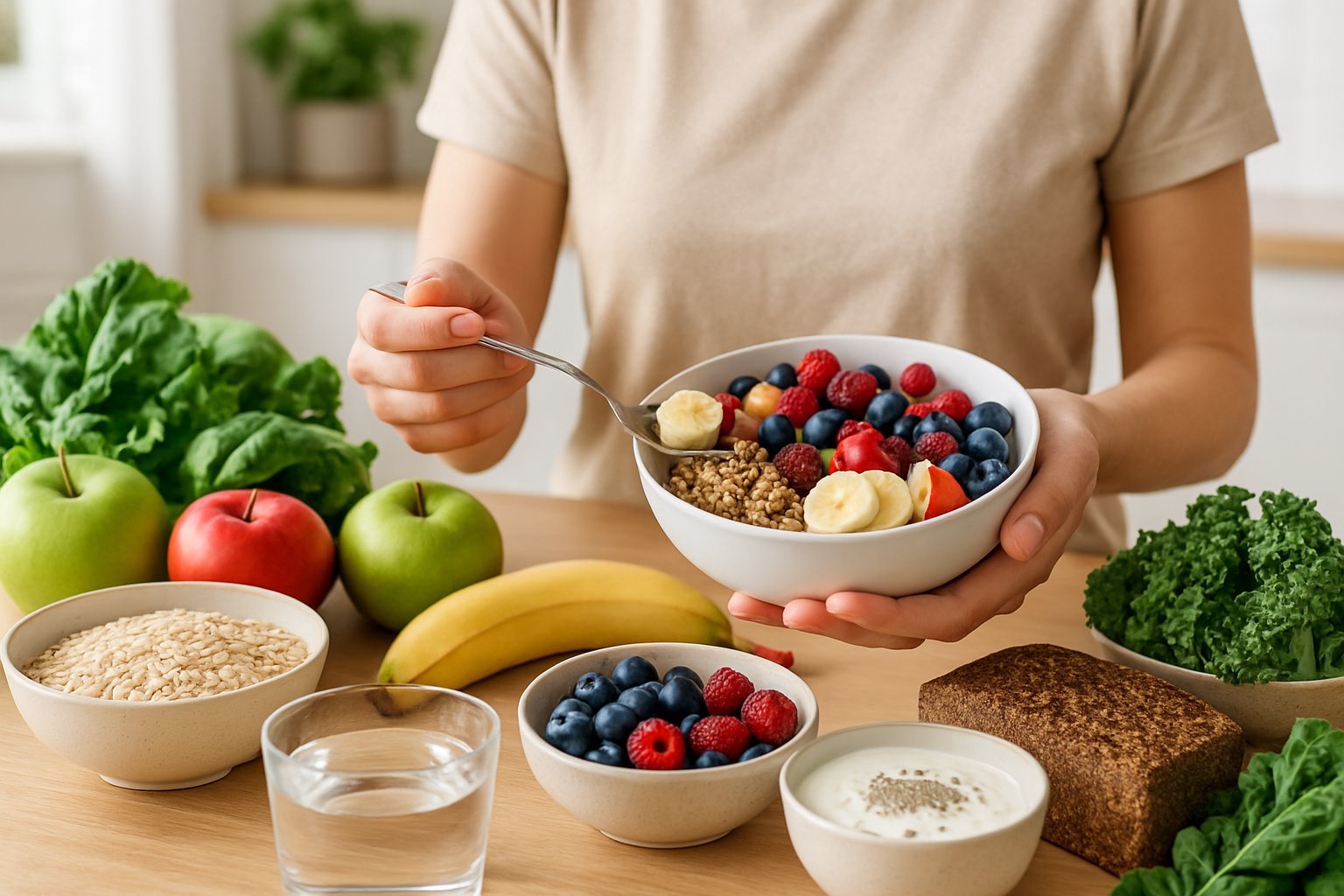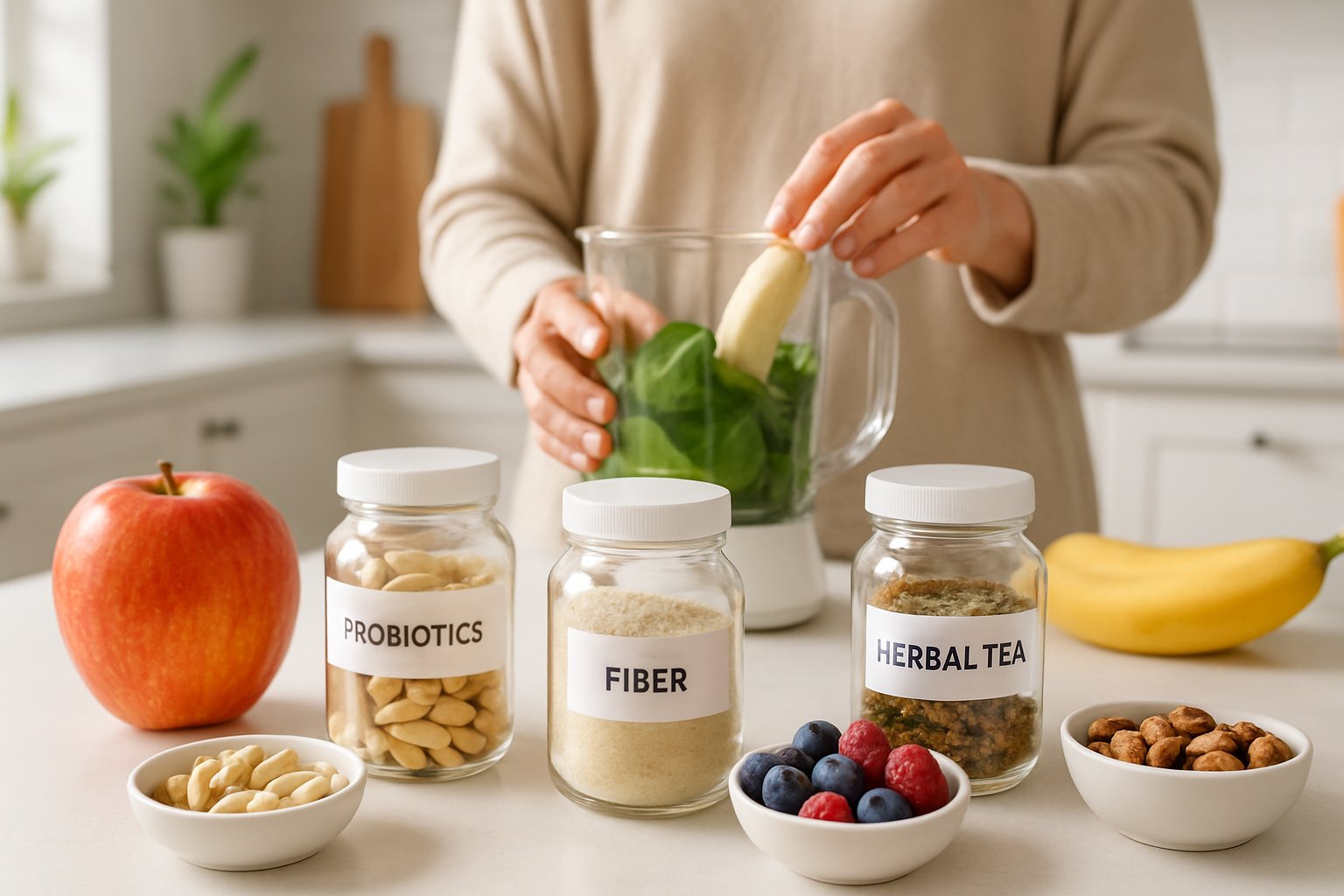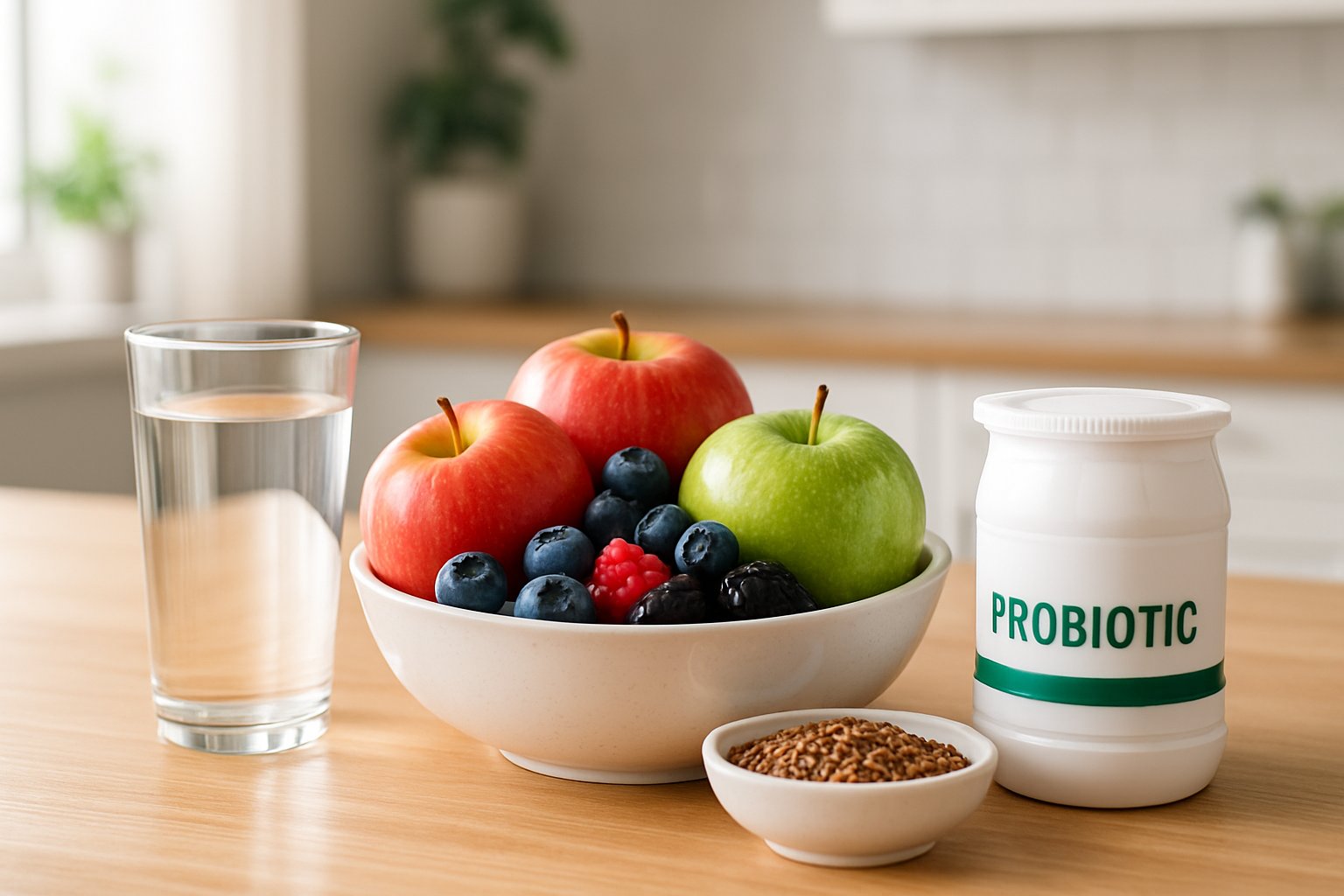Daily fiber intake of 25-35 grams from whole foods and adequate water consumption form the foundation of bowel regularity. Probiotics from yogurt or supplements support healthy gut bacteria that aid in proper digestion and elimination. Natural foods like prunes, pears, and leafy greens provide gentle, effective relief without harsh side effects.
Many people struggle with irregular bowel movements, but the solution often lies in simple daily choices. The most effective daily strategies for maintaining regular bowels include consuming 25-35 grams of fiber from whole foods, drinking 8 glasses of water, and incorporating probiotics through yogurt or supplements. These approaches work by adding bulk to stool, keeping it soft, and supporting healthy gut bacteria.

Regular bowel movements typically occur anywhere from three times per week to three times per day[1], and consistency matters more than frequency. When someone experiences fewer than three bowel movements per week, they may be dealing with constipation that affects their daily comfort and energy levels.
The good news is that most people can improve their bowel regularity through proven dietary and lifestyle changes. From high-fiber foods like oats and broccoli to natural laxatives found in prunes and pears, there are numerous safe options that work with the body’s natural processes rather than against them.
Daily Dietary Choices for Bowel Regularity

Making smart food choices each day can help maintain healthy bowel movements and prevent constipation. The right combination of fiber, adequate hydration, and specific nutrient-rich foods creates the foundation for digestive regularity.
Fiber-Rich Foods and Recommended Intake
Adults need 25-35 grams of fiber daily for optimal bowel function. Most people fall short of this target, which contributes to digestive issues.
Soluble fiber dissolves in water and forms a gel-like substance. It helps soften stool and makes it easier to pass. Insoluble fiber adds bulk to stool and speeds up its movement through the intestines.
| Fiber Type | Daily Amount | Key Benefits |
|---|---|---|
| Soluble | 10-15 grams | Softens stool, feeds gut bacteria |
| Insoluble | 15-20 grams | Adds bulk, prevents constipation |
People should increase their fiber intake gradually. Adding too much fiber too quickly can cause bloating and gas. Slowly increasing fiber intake[2] helps the digestive system adjust.
The best approach combines both types of fiber throughout the day. This ensures comprehensive digestive support and reduces the risk of uncomfortable symptoms.
Hydration and Its Impact on the GI Tract
Water plays a crucial role in maintaining soft, easy-to-pass stools. Without enough fluids, fiber can actually worsen constipation by creating hard, dry waste.
Adults should drink 8-10 glasses of water daily. Those eating high-fiber diets need even more fluids to help fiber work effectively.
Key hydration benefits:
- Softens stool consistency
- Helps fiber swell properly
- Supports intestinal muscle contractions
- Prevents hard, painful bowel movements
People can boost hydration with herbal teas, broths, and water-rich foods. Fruits like watermelon and cucumbers contribute to daily fluid intake while providing additional nutrients.
Specific Fruits and Vegetables for Regularity
Certain produce items contain natural compounds that promote bowel movements. These foods combine fiber with other beneficial nutrients for digestive health.
Top constipation-fighting fruits:
- Prunes contain sorbitol, a natural sugar alcohol that draws water into the intestines
- Kiwifruit provides both soluble and insoluble fiber plus digestive enzymes
- Apples offer pectin, a soluble fiber that helps regulate bowel movements
- Pears contain high amounts of fiber and natural sugars that aid digestion
- Figs provide fiber and natural laxative compounds
- Oranges supply fiber and vitamin C for digestive support
Beneficial vegetables include:
- Broccoli and Brussels sprouts offer insoluble fiber and sulfur compounds
- Leafy greens like spinach provide magnesium and fiber
- Root vegetables add bulk-forming fiber
Prune juice works quickly due to its high sorbitol content. Just 4-6 ounces can stimulate bowel movements within hours.
Whole Grains, Legumes, Nuts, and Seeds
These food groups provide substantial amounts of both fiber types plus important minerals for digestive health.
Whole grains retain their bran and germ, making them fiber powerhouses. Oats, quinoa, brown rice, and whole wheat products support regular bowel movements better than refined grains.
Legumes like beans, lentils, and chickpeas contain 6-15 grams of fiber per serving. They also provide protein and B vitamins that support overall digestive function.
Nuts and seeds offer concentrated nutrition:
- Chia seeds absorb water and create a gel that helps stool pass smoothly
- Flaxseeds provide omega-3 fatty acids and both fiber types
- Almonds and walnuts contribute healthy fats and insoluble fiber
A high-fiber meal plan[2] incorporating these foods can provide 36+ grams of fiber daily. This amount supports healthy digestion and regular bowel movements for most people.
Science-Backed Supplements and Lifestyle Strategies

Certain supplements like fiber and probiotics work alongside magnesium to support natural bowel movements. Regular movement and stress management also play crucial roles in maintaining healthy gut motility and digestive function.
Fiber and Probiotic Supplements
Fiber supplements provide the bulk needed for healthy bowel movements. Psyllium husk is one of the most effective options, absorbing water to form soft, bulky stools.
Methylcellulose and wheat dextrin offer gentler alternatives for those sensitive to psyllium. These supplements work best when taken with plenty of water throughout the day.
Daily Fiber Targets:
- Women: 25 grams
- Men: 38 grams
- Start with 5-10 grams and increase gradually
Probiotics support gut health by maintaining healthy bacterial balance. Strain-specific probiotics studied in human clinical trials[3] show the most reliable results for digestive regularity.
Lactobacillus rhamnosus and Bifidobacterium longum strains have research supporting their role in bowel regularity. These beneficial bacteria help maintain normal gut motility and reduce constipation symptoms.
Fermented foods like yogurt and sauerkraut provide natural probiotics. However, supplement forms deliver higher concentrations of specific strains.
Magnesium and Natural Laxative Support
Magnesium draws water into the intestines, softening stool and promoting bowel movements. Magnesium oxide and magnesium citrate are common forms used for constipation relief.
Typical dosing ranges from 200-400 mg daily. Start with lower doses to assess tolerance, as too much magnesium can cause diarrhea.
People with kidney disease should consult healthcare providers before taking magnesium supplements. This mineral can accumulate in those with impaired kidney function.
Herbal teas offer gentle natural laxative support. Senna tea provides stronger effects but should only be used short-term to avoid dependency.
Natural Options:
- Prune juice (contains sorbitol)
- Flaxseeds (fiber and omega-3s)
- Aloe vera juice (use cautiously)
Coffee and caffeine can stimulate bowel movements in some people. The warm liquid and caffeine both contribute to increased gut motility in the colon.
Movement, Exercise, and Stress Management
Regular movement helps food move through the GI tract more efficiently. Walking for 20-30 minutes daily can reduce constipation symptoms significantly.
A sedentary lifestyle slows gut motility and contributes to chronic constipation. Even light activity throughout the day makes a difference for bowel health.
Effective Exercises:
- Brisk walking
- Yoga poses (child’s pose, twisting poses)
- Swimming
- Cycling
Yoga specifically targets digestive health through twisting movements and deep breathing. These poses massage internal organs and reduce stress that can affect bowel function.
Chronic stress disrupts normal digestive patterns and can worsen irritable bowel syndrome symptoms. Stress hormones slow gut motility and change bacterial balance.
Stress Management Techniques:
- Deep breathing exercises
- Regular sleep schedule (7-9 hours)
- Meditation or mindfulness
- Limiting processed foods
Proper hydration supports all digestive functions. Dehydration makes stool harder and more difficult to pass. Adults need about 8-10 glasses of water daily, more with fiber supplements.
Frequently Asked Questions

People often ask about specific dietary changes, supplements, and lifestyle factors that affect bowel regularity. Common concerns include water intake requirements, exercise routines, and stress management techniques that support healthy digestion.
What dietary changes can support regular bowel movements?
Fiber-rich foods form the foundation of healthy bowel habits. Adults need 25 to 35 grams of fiber daily from sources like fruits, vegetables, whole grains, and legumes.
Adding fiber gradually prevents bloating and gas. A sudden increase can cause digestive discomfort and worsen constipation temporarily.
Prunes contain natural compounds that stimulate bowel movements. Eating 6-8 prunes daily often helps people maintain regularity.
Beans, lentils, and chickpeas provide both soluble and insoluble fiber. These foods help soften stool and promote regular elimination.
Which supplements are recommended for maintaining digestive health?
Magnesium supplements help promote regularity[4] by pulling water into the intestines and stimulating contractions. Magnesium glycinate offers gentle effects without causing urgent bathroom trips.
Probiotics containing specific strains support gut health and regularity. Products with clinically studied strains work better than generic options.
L-theanine helps reduce stress-related constipation. This amino acid promotes calm brain waves and supports healthy neurotransmitter production.
Fiber supplements can help people who struggle to get enough fiber from food. Psyllium husk and methylcellulose are gentle options that work gradually.
How does water intake affect bowel regularity?
Water works with fiber to keep stool soft and easy to pass. Without enough water, fiber can actually worsen constipation.
Most adults need 8-10 glasses of water daily. People who eat high-fiber diets need even more water to prevent digestive issues.
Dehydration causes the colon to absorb more water from waste. This creates hard, difficult-to-pass stools.
Drinking a large glass of water first thing in the morning often triggers the urge to have a bowel movement. This simple habit helps many people stay regular.
Are there any specific exercises that promote healthy digestion?
Walking, swimming, and regular physical activity[5] help stimulate bowel movements. Aim for exercise 3-4 times per week.
Yoga poses like child’s pose and seated twists massage the digestive organs. These gentle movements can help relieve constipation.
Deep breathing exercises activate the parasympathetic nervous system. This helps the digestive system function more effectively.
Squatting positions during bowel movements make elimination easier. Using a footstool to elevate the knees mimics this natural position.
What are the signs that indicate a need for changing bowel health habits?
Going fewer than three times per week indicates constipation. Straining, hard stools, or feeling incomplete after bowel movements also signal problems.
Changes from normal patterns matter more than specific numbers. Someone who normally goes daily but suddenly goes every few days may need help.
Bloating, abdominal pain, and feeling weighed down suggest digestive issues. These symptoms often improve with dietary and lifestyle changes.
Blood in stool, severe pain, or sudden changes in bowel habits require medical attention. These signs may indicate serious underlying conditions.
How can stress management impact bowel function?
Stress causes intestinal muscles to tense[4], which slows digestion and can lead to constipation. The gut-brain connection strongly affects bowel regularity.
Meditation, deep breathing, and relaxation techniques help activate the rest-and-digest response. This allows the digestive system to work properly.
Regular sleep schedules support healthy bowel patterns. Poor sleep disrupts hormones that control digestion.
Chronic stress depletes magnesium levels in the body. This mineral deficiency can worsen constipation and digestive problems.
References
- 30 Foods That Will Help Keep You Regular. https://health.alot.com/wellness/30-foods-that-will-help-keep-you-regular--15527 Accessed October 25, 2025
- Slowly increasing fiber intake. https://www.eatingwell.com/simple-7-day-meal-plan-to-help-you-poop-11699394 Accessed October 25, 2025
- Just a moment.... https://seed.com/cultured/best-gut-health-products-science-guide/ Accessed October 25, 2025
- Magnesium supplements help promote regularity. https://www.eatingwell.com/supplements-to-help-you-poop-8765310 Accessed October 25, 2025
- Constipation - self-care: MedlinePlus Medical Encyclopedia. https://medlineplus.gov/ency/patientinstructions/000120.htm Accessed October 25, 2025
